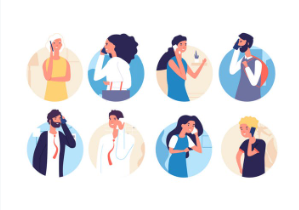

Report Racism
BCAAFC has partnered with the Safespace Networks pilot project to give Indigenous patients across BC the ability to submit their positive and negative healthcare experiences, with the first pilot being focused on the experiences of racism in healthcare.
There are resources to support you after you’ve shared your experience that can be found below.
Crisis Lines & Support Resources for Mental Wellness
KUU-US Crisis Lines
Adult Crisis Line: 250-723-4050
Youth Crisis Line: 250-723-2040
BC wide: 1-800-588-8717
youthspace.ca
youthinbc.com
Native Youth Crisis Hotline: 1-877-209-1266
First Nations Health Authority (FNHA)
Mental Wellness and Counselling
Guide to Mental Health Counselling Services
Telehealth

Safespace Anonymous Experience
Overview of Sharing your Experience

Share safely. Be heard.
Safespace is a safe, anonymous way to share your healthcare experiences with an organization you already trust. This will be a short description of what you can expect when sharing your experience through this web app.
On June 19, 2020, the BCAAFC and Métis Nation BC issued a media release calling upon the Ministry of Health to accept four recommendations following reports of a racist game played by hospital staff in BC:
- A public inquiry into Indigenous specific racism in health care in B.C with a focus on hospitals and emergency departments.
- Ensure that all front-line staff are required to take mandatory First Nations, Métis and Inuit training that results in increased health professional personal accountability in the delivery of safe health care.
- Commit to structural and systemic changes to dismantle indigenous specific racism to ensure culturally safe health care experiences for Indigenous people.
- Ensure that Indigenous governments play a stronger role in the development and implementation of anti-racism programs and training throughout BC.
There are resources available to you if you’d like to pursue other ways of reporting discrimination, stereotyping and racism.
Resources for Reporting Discrimination, Stereotyping and Racism
- Legal Support Services
- Community Legal Assistance Society (CLAS)
- Pacific Legal Education and Outreach Society (PLEO)
- Aboriginal Legal Aid in BC
- Office of the Ombudsperson
- Province of BC: Make a Complaint About Child or Family Service
- Province of BC: Make a Teacher Complaint to the Commissioner for Teacher Regulation
- Resources for Reporting Discrimination in Health Care
- Dial-A-Law: Medial Malpractice
- Dial-A-Law: If You Have a Problem with a Doctor
- BC Health Regulators: Complaints About Care
- BC Health Regulators: Regulatory Colleges for Complaints (21)
- Provincial Health Services Authority: Patient Care Quality Office
- Province of BC: Patient Care Quality Review Boards
Harm is common in the health system. Up to 4 in 10 patients can be harmed in healthcare settings based on research done by the World Health Organization. For Indigenous patients, this harm can be both more likely and more frequent.
When patients report harm, it can be a very risky process. When sharing concerns, the relationship between your you, your provider and the health system can be damaged. In serious situations, this can loss of trust, changes in how your provider interacts with you and potential loss of healthcare access.
While we do not know how frequently this occurs, Indigenous patients have reported that those who harm may seek to discredit their experiences as they work to defend themselves.
All of this puts patients in the situation where they have to shoulder the burden of changing health systems. It’s common to hear from Indigenous patients that they have to “risk it all” to get their concerns addressed.
When investigations do move forward, its rare to get updates in real-time. When decisions are made in favour or against a complaint, Indigenous patients never know who made the decision. In broader systemic issues like racism, investigations are required to have a narrow focus on the specific concerns.
Finally, even if a complaint is found to be supported and the individual who caused harm is removed the harm doesn’t necessarily disappear. Systemic racism in the same system can enable a new person to cause harm, even when harmful individuals are removed.
BCAAFC has joined the Safespace Networks pilot project to address these barriers to reporting. Safespace Networks is a platform that creates learning health systems. Learning health systems are able to do more than react to negative experiences and healthcare harm, they can prevent them from happening.
We know that the #1 reason you probably don’t report is because of fear. Fear of retaliation, fear of losing your access to care, fear of making things worse for yourself. When you report through Safespace, you will always be anonymous. We do not collect your name, email or any other identifying information. After you submit your experience, it will be reviewed to ensure that it’s truly anonymous. As more Indigenous patients share their experience, there will be new ways opened up to you on how you can share and communicate anonymously within the Safespace Network. Some of these features will require you to download an app, but you will always remain anonymous because we designed it that way.
Over time your experiences and ratings will help Safespace Networks discover patterns of care across BC.
Anonymous insiders – persons like doctors, nurses, health directors and others – will weigh in and share whether they see the same things.
Together, users and insiders validate patterns. We use validated patterns to help Indigenous patients make more informed choices on how to access care and to help health systems make better decisions about health system design.